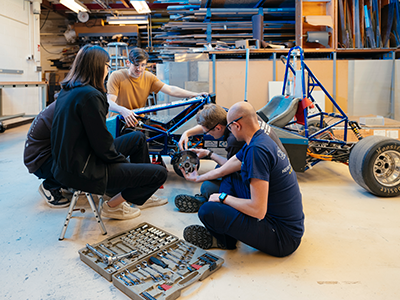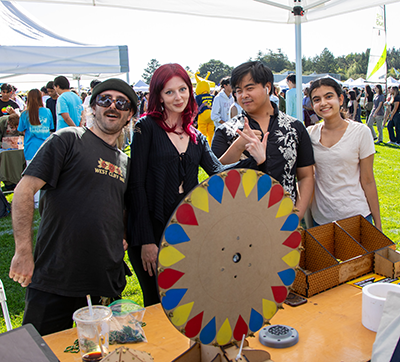Slugworks, a new creatorspace on campus located in the Jack Baskin Engineering building, is full of tools and machines for all types of crafting, metalworking, fabrication, woodworking, and more. But for the people who envisioned, planned, and are making Slugworks a reality, fostering a collaborative community within the space is just as important as the machines and tools.
Slugworks, which is now open to all undergraduates, is designed to be a space for students to pursue their projects and passions side-by-side and in collaboration with others from across campus. Throughout the quarter, Slugworks will host two classes, a series of free workshops, and open lab hours for students to take advantage of this creative space. The current open hours run from noon to 9 p.m. Monday through Friday, with weekend open hours in the works.
“Inclusion, innovation, and imagination are our big pillars,” said Slugworks manager Nick Kouatli. “In my eyes, I think it's the coolest thing when you can get a bunch of different minds working together. When we work interdisciplinarily, really cool things happen. We want to create an open, welcoming, and collaborative community.”
Slugworks has four main rooms, each with its own purpose. The first room (BE-53), “the Creatorspace” is home to most of the light machinery and crafting tools with a 3-D printing farm, Cricut vinyl cutting machines, screen printing and heat press, sewing machines, a fabric arts section, electronic assembly, a jewelry-making zone and more. Students need to take a brief online safety training to use this space.
Another is the shop space (BE-51), nicknamed “Area 51,” which houses the more heavy-duty equipment for CNC and manual machining, sheet metal fabrication, laser cutting, and more. Students will be required to complete a higher level of safety training to use this equipment.
For both spaces, any interested students can access safety training courses through Canvas. Once completing the introductory online course, students can come down to Slugworks for a general safety walkthrough of the space, held at 2 p.m., 4 p.m., and 6 p.m. Monday through Friday.
The third room is a classroom space (BE-55), which will host two integrated classes; CMPM115: Lead by Design and CMPM:17 First-Year Design. Lead by Design is a class for juniors and seniors in which the students develop a template for a 10-week long engineering design project that takes advantage of the Slugworks equipment and facilities. These students then have the opportunity to teach that project as one of the First-Year Design classes, which are meant to give any interested incoming students hands-on design experience and insight into possible tracks within the Baskin School of Engineering.
These courses were designed by Baskin Engineering Associate Dean for Undergraduate Experience Jim Whitehead, Director of Experiential Learning at Baskin Engineering Tamara Ball, Associate Teaching Professor Tela Favaloro, with support from Executive Advisor to the Engineering Dean Abigail Kaun, who also contributed to the planning and launch of Slugworks.
“The beating heart of engineering is designing and building in teams,” Whitehead said. “Our First Year Design courses let students experience the deep satisfaction of designing something complicated, and bringing it to life.”
The fourth room is the “Club Hub,” a space for student organizations to craft their machines and devices (BE-49). Currently this space is being used by Rocket Team, Formula Slug, Slugbotics, and Pinpoint, but is open to more. Anusha Pai, a UCSC Chancellor’s Undergraduate Intern working for Slugworks, is actively connecting with all types of student groups to bring them into the space, such as groups looking to make design props for a production, 3-D print equipment for a chemistry experiment, build rockets, or anything in between.
“It’s a space not only for Baskin Engineering students, but also for students of all majors,” Pai said. “We're trying to get people and clubs from all over the university to come and use the space because we're trying to form a collaborative community. That’s what drew me to want to be part of Slugworks.”
Slugworks is hosting a series of free workshops throughout the fall quarter to bring students into the classroom space, teach them new skills, and highlight the art and technology opportunities available. Workshops throughout the quarter build upon one another but can also be taken as standalone classes.
“I want to highlight the intersection between art and technology with these workshops,” Kouatli said. “The intention of these workshops is to introduce students of all backgrounds, who might initially be intimidated by some of the machines in the space, to all of the different resources within Slugworks. I hope we show those students how accessible and useful a lot of these machines are.”
Workshop topics this quarter include: Intro to sewing, vector design and design for print, jewelry making workshop using the laser cutters, intro to screen printing, decals and heat press, CAD and design for manufacturing, RC car build. The classroom will host additional events throughout the year.
Pai and Erik Magdales, also a Chancellor’s Undergraduate Intern, will focus on social media, event-planning, graphics and other outreach efforts for Slugworks. Several other student workers will be employed in the space to do upkeep, organization, run safety training, and supervise open lab hours, as well as helping with outreach.
Overall, the people behind Slugworks want to cultivate a space where students who have different interests, passions, and expertise can come together to make something, whether that be for a club, a class assignment, or a passion project.
“I want it to be a really cool, fun, creative space,” Kouatli said. “I’ve been a part of a lot of makerspaces in the past, and that’s my favorite part — when everyone can work together and use their own skill sets and niches, but can come up with a project idea that brings those different skills together.”
Slugworks welcomes students across campus to new creative space




